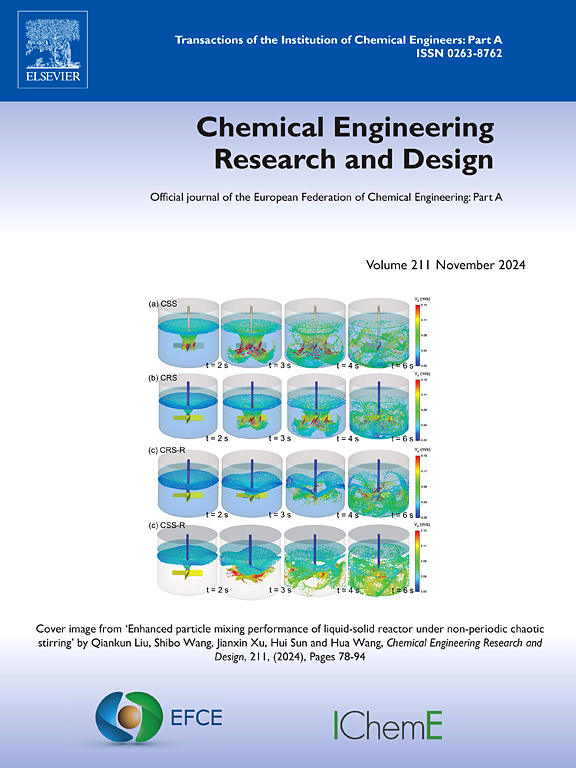基于微波的直接空气捕获填料床反应器中二氧化碳再生研究
IF 3.7
3区 工程技术
Q2 ENGINEERING, CHEMICAL
引用次数: 0
摘要
本研究调查了微波辅助直接空气捕集(DAC)的应用,使用沸石 13X 捕集阿拉巴马州塔斯卡卢萨大气中的二氧化碳。在再生过程中,采用了带有 E 向空腔的单模固态微波发生器来解吸吸附剂中的二氧化碳。这项研究的主要目的是探索基于微波的 DAC 系统,因为目前还没有详细的参数研究来评估所有解吸特性,包括温度和微波初始功率对二氧化碳生产率、再生效率、解吸动力学、能耗、温度均匀性、吸附和解吸能力的影响。为了研究所有这些解吸特性,进行了十六次非循环实验和十次循环实验。在非循环实验中,再生温度和微波初始功率分别从 45 ℃ 到 100 ℃ 和从 5 W 到 60 W。结果表明,在再生率为 100% 和 70% 的情况下,解吸一千克二氧化碳的能耗分别可低至 60.37 兆焦耳和 23.97 兆焦耳。在循环实验中,在最低温度和功率条件(45 ℃ 和 5 W)下分析了每次实验的吸附能力以及 70 % 解吸对后续实验吸附能力的影响。结果发现,70% 的解吸对后续循环的吸附能力没有显著影响。这项研究还证明,即使在低温和初始功率值条件下,也能在 3100 秒内实现二氧化碳的完全再生。本文章由计算机程序翻译,如有差异,请以英文原文为准。
Investigation of microwave-based CO2 regeneration in a packed bed reactor for Direct Air Capture
This study investigates a microwave-assisted Direct Air Capture (DAC) application using Zeolite 13X to capture CO2 from the atmospheric air in Tuscaloosa, Alabama. For the regeneration process, a mono-mode solid state microwave generator with E orientation cavity was applied to desorb CO2 from the sorbent. The main purpose of this study is to explore microwave-based DAC system since there is no detailed parametric study which evaluates all desorption characteristics including temperature and microwave initial power effects on CO2 productivity, regeneration efficiency, desorption kinetics, energy consumption, temperature homogeneity, adsorption, and desorption capacities. In order to investigate all these desorption characteristics, sixteen non-cycling and ten cycling experiments were performed. In non-cycling experiments, regeneration temperature and microwave initial power changed from 45 ℃ to 100 ℃ and from 5 W to 60 W, respectively. The results illustrate that energy consumption to desorb a kg of CO2 can be as low as 60.37 MJ and 23.97 MJ for 100 % and 70 % regeneration, respectively. In cycling experiments, adsorption capacity of each experiment and the effects of 70 % desorption on the adsorption capacity of following experiments were analyzed at the lowest temperature and power conditions (45 ℃ and 5 W). It was found that 70 % desorption does not have significant effects on the adsorption capacity for the following cycles. This study also proves that complete CO2 regeneration can be achieved even at low temperature and initial power values in 3100 seconds.
求助全文
通过发布文献求助,成功后即可免费获取论文全文。
去求助
来源期刊

Chemical Engineering Research & Design
工程技术-工程:化工
CiteScore
6.10
自引率
7.70%
发文量
623
审稿时长
42 days
期刊介绍:
ChERD aims to be the principal international journal for publication of high quality, original papers in chemical engineering.
Papers showing how research results can be used in chemical engineering design, and accounts of experimental or theoretical research work bringing new perspectives to established principles, highlighting unsolved problems or indicating directions for future research, are particularly welcome. Contributions that deal with new developments in plant or processes and that can be given quantitative expression are encouraged. The journal is especially interested in papers that extend the boundaries of traditional chemical engineering.
 求助内容:
求助内容: 应助结果提醒方式:
应助结果提醒方式:


